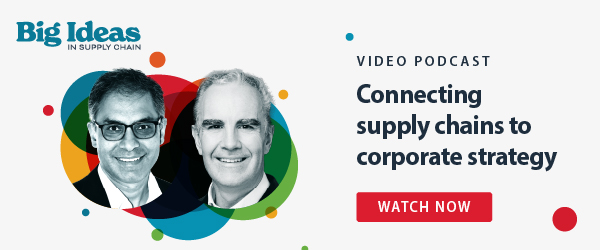Supply chains have always played an important role within their organizations – something that executive teams recognized but were not worried about, as long as supply chains did not collapse. Until now.
Pandemic shortages and disruptions have shifted the way boards and executives view supply chains, causing many in C-suite positions to bring subsequent supply chain topics to the table, specifically, what tools, resources, and strategies they need to manage disruption and emerge more resilient in an uncertain climate.
To understand how the current generation of supply chain leaders are engaging with executives and boards, Tariq Farooq, former SVP Global Supply Chain at Sanofi, and Matt Spooner, Industry Thought Leader at Kinaxis, discuss the importance of building a resilient supply chain that is prepared for any disruption in our latest Big Ideas in Supply Chain podcast.
Here are some key takeaways from their discussion.
Why supply chains launched to the top of the corporate agenda
Boards and executives are beginning to prioritize their supply chains, a shift that has been rising most notably in consumer-packaged goods (CPG) companies, as well as high-tech. And while many of these organizations are doing a lot to support their supply chain teams’ performance, capability, and innovation, this level of commitment hasn’t always been the case.
Tariq remembers a time when supply chain was taken for granted. So long as it was working, no one paid any attention to its operations.
Those days are in the past. Today, everyone from the C-suite executives to consumers is more aware of supply chains than ever before. As more people learn how supply chains keep goods and services moving around the world according to demand, the perception of supply chain importance has also been changing. However, when supply chains do face critical challenges or disruption, supply chain planners still risk tension and lack of confidence if consumers can’t get the things they want, when they want them.
To combat this, Tariq believes supply chain topics need to be discussed more thoroughly and at a higher level. “Supply chain was always something that was important to the business as a whole. […] As we think about how we design and operate supply chains, it's not just a topic for the head of supply chain, but it's a topic for the executive committee and indeed the board overall.”
The call for resilience in uncertain times
Supply chains need to have robust plans in place to mitigate disruption, but while many supply chain leaders believe that resilience is essential, they also believe that this is only if it’s cost neutral. So, how do companies holistically balance the two?
Tariq states that, historically, companies were focused primarily on supply chains’ abilities to cut down costs. Previously, larger companies were achieving cost efficiency by mono-sourcing and maintaining lower inventories, which was successful when there were fewer supply chain risks than what we’re facing today.
As a result of today’s disruptive climate, companies need to dynamically adapt to encompass factors like resilience, to prepare for an uncertain future. To do this, organizations need to reconsider the “supply chain triangle,” where the goal was balancing cost, cash, and service. Tariq states that in a post-pandemic world, this triangle will look more like a pentagon where companies will need to balance cost, cash, service, environmental impact, and resilience.
Tariq believes that it will become increasingly important for everyone in the supply chain to leverage digital tools, advanced planning systems, and automation to try to balance the pentagon moving forward. By using the tools, processes, capabilities, and talents that enable supply chains to better balance those five elements, not only will they be able to better serve their consumers and stakeholders, but also do it in a way that is more resilient.
To hear more about supply chains and their connection to corporate strategy from Tariq and Matt, you can watch the full podcast here:






